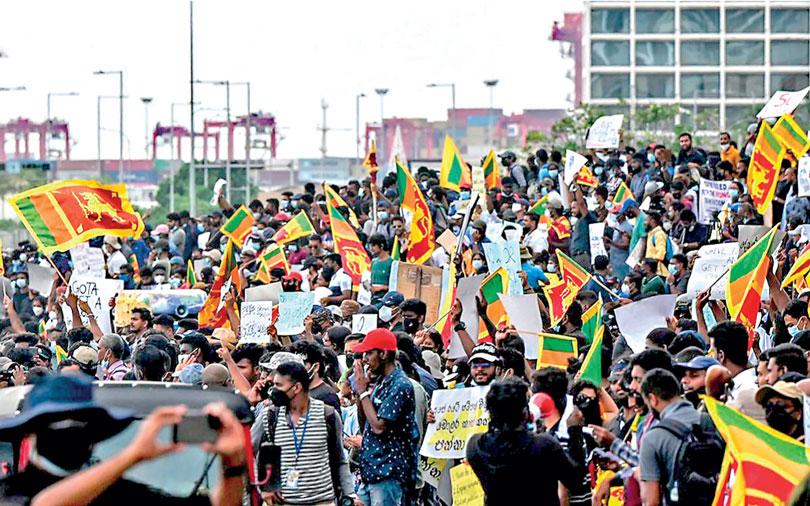27 Sep 2022 - {{hitsCtrl.values.hits}}

Some 84 people have been arrested by Sri Lankan police as hundreds of protestors gathered in Colombo raising their voice against what they claimed was "suppression" by the government.
 President Ranil Wickremesinghe on Friday night issued an extraordinary gazette notification, declaring several areas in Colombo as High-Security Zones (HSZ), evoking wartime memories - as if Sri Lanka is fighting a renewed terrorist insurgency.
President Ranil Wickremesinghe on Friday night issued an extraordinary gazette notification, declaring several areas in Colombo as High-Security Zones (HSZ), evoking wartime memories - as if Sri Lanka is fighting a renewed terrorist insurgency.
The Gazette notification, issued under Section 2 of the Official Secrets Act, No 32 of 1955, declared the Parliament Complex, the Supreme Court Complex, the High Court Complex, the Colombo Magistrate’s Court Complex, the Attorney General’s Department premises, the Presidential Secretariat, the President’s House, the Headquarters of the Sri Lanka Navy and Police, the Ministry of Defence and Sri Lanka Army Headquarters in Akuregoda, Sri Lanka Air Force Headquarters in Colombo, the Prime Minister’s Office, Temple Trees, and the official residences of the Secretary to the Ministry of Defence and the Commanders of the Tri-Force, and all roads and the vicinity of these buildings as HSZs.
All public gatherings and processions are banned within the HSZ (unless written permission is obtained from the Inspector General of Police or the Senior Deputy Inspector General of Police of the Western Province). No vehicles should be parked within the HSZs unless reserved by a competent authority and no construction or excavation should be carried out without obtaining written permission.
In an echo of wartime, the chief occupant of buildings located within the HSZs should provide a list of permanent and temporary residents to the Police. Any changes in the occupancy should be notified within 24 hours. Government departments and private institutions located within the HSZ should provide details of all employers to the relevant police station.
Persons taken into custody in connection with offences under the orders announced through the gazette can only be granted bail by a High Court. This amounts to a step beyond the purview of the Official Secrets Act. According to the Bar Association of Sri Lanka, Section 22 of the Official Secret Act empowers a Magistrate to release a suspect on Bail. “As such the purported order seeks to significantly curtail the liberty of the citizen, without any reasonable or legal basis,” BASL noted in a statement.
There will be unintended though fairly predictable consequences of the imposition of HSZ in the heart of Colombo. If history is any guide, this would be a harbinger of a garrison city in Colombo and heightened militarization of the rest of the country. Unwanted security checkpoints cropping up in the city should be expected. Stepped-up surveillance activities by the military would be another predictable outcome.
That is the exact opposite of what the government intends as it lures tourists and investments. There will be little investor appetite to pour money into a country that deliberately reverts to its wartime self.
The incumbent president, Ranil Wickremesinghe since his rise to office thanks to the good grace of the Pohottuwa strategist, Basil Rajapaksa, has ushered in a new phase of militarization and securitization of the state. The measures such as the reimposition of the Emergency regulation (which was subsequently lifted) and the use of the Prevention of Terrorism Act against peaceful protestors, etc are more visible examples. The greater danger lies in his providing an enlarged role for the military forces in peacetime, which would have far-reaching consequences. With 346,000 active personnel, more than twice the size of Israeli defence forces, the Sri Lankan security forces had been lacking of a mission to justify its excessive manpower and drain on the public coffer as a result of it, since the end of the war.
Right-sizing of it, like many other bloated government institutions, should be the need of the hour, to make it a modern army, instead of the mass army it is now, and to optimize the government’s military spending. Instead, President Wickremesinghe is gradually making it an organ of surveillance and coercion of the state on behalf of an unelected presidency and discarded ruling party.
Latest decree is another step in that direction
Sri Lanka is not fighting an existential threat, which necessitated the imposition of HSZs, and other restrictive security measures in the past. Instead, if anything, the latest gazette notification and a slew of recent decisions are a vindication of the insecurity of a president who is devoid of electoral legitimacy.
The president is criminalizing legitimate dissent, protests and assembly. This is also the failed Operandi resorted to by his uncle JR Jayawardene, who at end of his term, bequeathed a country besieged by twin insurgencies in the North and South.
President Wickremesinghe smacks of the vindictiveness, arbitrariness and self-importance of his great uncle. His recent conduct bear witness to this. Like JR did four decades back by banning the JVP and a number of leftist parties, and forcing Tamil political parties out of Parliament, President Wickremesinghe is pushing the peaceful protestors to the wall by crushing legitimate protests.
There is hardly any security necessity for most of the legal and security measures he has taken. Their utility can only be explained by the nature of the power grab undertaken by the discarded old guard of the Rajapaksasa’s with Ranil Wickremesinghe serving as a cat’s paw.
These measures, including the latest decree on HSZs, are vindictive, arbitrary and deleterious to the nation. Sri Lankans should oppose these measures. Sadly, they are helpless to do so.
Follow @RangaJayasuriya on Twitter
10 Jan 2025 2 hours ago
10 Jan 2025 2 hours ago
10 Jan 2025 3 hours ago
10 Jan 2025 4 hours ago
10 Jan 2025 4 hours ago